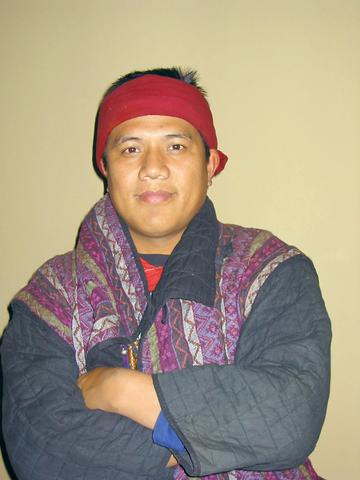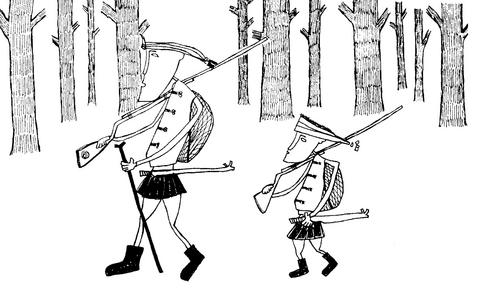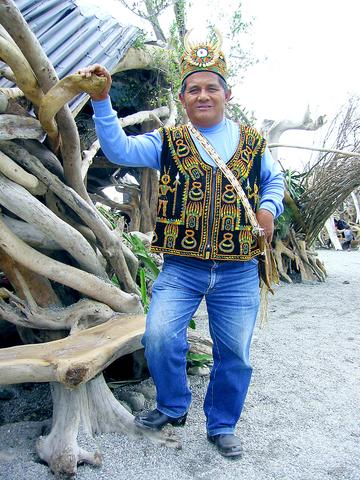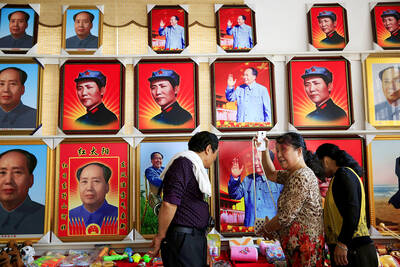"The man who leads the wind" is the way the Paiwan (
Ina-vali (走風的人), which roughly translates as "leading the wind," is the title of his new book, which although released less than a month ago, is already in its fourth printing. The strong sales of Ina-vali are encouraging for Sakinu's larger ambitions, as they form the basis of his funding for the creation of a "hunting school," an institution which he hopes will help Aborigines recognize the value of their tradition in practical as well as theoretical terms.

PHOTO: IAN BARTHOLOMEW, TAIPEI TIMES
And by practical, he does not particularly mean shooting animals.

Identity, respect, pride: these are the things that Sakinu believes hunting is all about. He regards his upbringing as a hunter under his father's tutelage as the defining element of his character.
A hunter's pride

PHOTO: IAN BARTHOLOMEW, TAIPEI TIMES
Dressed in a padded jacket and wide pants of Aboriginal design, a woven red headband worn against the cold, he was the most distinctive character in a crowded Starbucks in Shihlin, where we met up -- in between teaching a class on Aboriginal worker's issues and a long journey back to his village in Taitung. What was most remarkable was that he didn't look dressed up: it was rather a proud state of his Aboriginal identity.
"Aborigines used to be ashamed of who they were," he said, speaking about the acquisition of his mother tongue, a laborious process started in adulthood. "[As a child], my father would not teach me my mother tongue because this would mark me as an Aborigine. I am one of very few of my generation who can converse in our mother tongue," he added, admitting that there are still many aspects of the language and its logic that elude him.
The father who would not teach him his mother tongue has now become his helper in recapturing a tribal identity and is the subject of Ina-vali, an account of how Sakinu learned the hunting lore from which he derives his wider philosophy.
"Hunting created a bond between us; it allowed us to communicate about things we otherwise would not have done."
In Ina-vali, Sakinu recounts his experience following his father into tribal hunting grounds and learning to read the language of the animals and of nature. He believes that it is this training as a hunter that has made his current achievements possible, for a hunter must have courage, self-assurance and judgment, things that he does not believe the Chinese education system gives to Aboriginal children.
"In the past, every village would have a men's house, the place of education and decision-making," he said. "With the establishment of schools, the importance of the men's house diminished, and with it the sense of tribal identity." For Sakinu, the men's house is fundamental to any sense of Aboriginal identity, and much of the money from his book sales and the numerous literary awards he acquired for his first book Mountain Pig, Flying Fox, Sakinu (山豬.飛鼠.撒可努), have been poured into a project to build a men's house where traditional wisdom can be taught.
"The men's house was a military establishment," Sakinu said. "It was how we defended ourselves. Now, of course, we do not go to war -- not actually -- but culture has become our battlefield. We should promote and be proud of what is good in our culture and should defend ourselves against what is bad [for the cultures around us]. This is what is important."
Moreover, it is the environment of the men's house and the activities of hunting in which tribal languages find their meaning. "There's no point learning our mother tongue unless it is going to be of use," he said. "[Our mother tongue] can only be used to express a way of life." Take away that way of life and the language becomes irrelevant. His comments here point up one of the gaping holes in the current government's mother-tongue education policy as it applies to Taiwan's Aborigines.
And for the Paiwan, hunting is part of that way of life -- even as it flies in the face of restrictive government policies that pay little heed to tribal tradition and the belief in Aboriginal lore of living in harmony with the environment. Much of Ina-vali reinforces the idea that Aborigines hunt only for subsistence, and are an integral part of the environment in which they live. "My father says, `don't call me a hunter, call me a man who keeps our ecology in balance.'"
A father's influence
Speaking with Vasekalan (戴明福), Sakinu's father, in Taitung recently, he lamented the commercial spirit that he believes has led to much of the damage to both the environment and Aboriginal culture. With a fatalistic smile, he says: "When we go hunting, we bring back one beast, and it is shared with our tribe. The Chinese go hunting and kill many, taking them to sell."
While proudly banging the drum of a return to tribal roots, Sakinu is not without a sense of irony about being an Aboriginal hunter in the modern age.
He writes amusingly about how his father's bush craft is now appropriated to avoid detection by the forestry authorities.
A more bitter irony is his father's Christian faith, the effects of which he writes about movingly in Ina-vali, telling of the removal of hunting trophies from the wall of his house and their replacement with a crucifix. "And my elder cousin is a preacher in our village," he admitted sheepishly. "But we get along."
Vasekalan's only comment was that it was easier to say a pray to the Christian God than to engage in the complex tribal rituals prescribed by custom. "But once he is engaged in the hunt, he reverts to tradition," Sakinu said. It is all a complex balancing act, but for Sakinu everything is possible once a sense of identity and belonging is established.
While Sakinu has prospered much better than many of his brethren, he still has a distrust of an establishment that has long trampled on Aboriginal rights. To build his men's house, he said he refused to ask for government funding and would not set up a foundation. He will rely on his book sales and other income from his published work. "For some tribes, even when they sacrifice a pig, they need government support to buy it," he said.
"We are hunters; we must rely on ourselves and each other," he said. Reasons for this attitude are not far to seek.
Speaking of the recent Festival of Austronesian Cultures sponsored by the Pingtung County Government, he said bitterly that the authorities had explicitly vetoed any attempt for the Taiwan's tribes to have direct contact with the visiting dance troupes supposedly representing Polynesian peoples of the South Pacific and Indian Ocean. "They said we needed to get official approval before anything could be done," he said.
"Last year, visiting the Philippines for a human rights conference, I got together with some local Aboriginal people. We made a contract of alliance. A tribal contract. It is the first time anyone has done this."
He wants to invite them to Taiwan at some stage, a gathering of tribal people that takes place outside the government framework.
Fortunately for Sakinu, both his books are selling well. His first book, Mountain Pig, according to Chou Jia-hui (周嘉慧), Sakinu's publisher, has already sold 200,000 copies. Sales have been greatly assisted by the fact that one of his stories has been incorporated into the junior high school text book. "Many students then go out and buy the book," Chou said.
His work was further popularized by the inclusion of another chapter from his first volume into the applied Chinese textbook of the Harvard Chinese language program. Negotiations are currently underway for a full English and Japanese translation of Mountain Pig, and individual chapters are already available in English translation through the publisher (思想生活屋國際事業, tel: 02-2254-6565). There is also talk of making a cartoon movie from his books.
Unfailingly upbeat, Sakinu insists that a balance can be found between tribal tradition and the modern world. That his books are being embraced by Taiwanese readers is a promising start, but he, more than anyone else, recognizes that it is in developing pride in their own tradition that hope for the Aborigines' future lies.

Many people noticed the flood of pro-China propaganda across a number of venues in recent weeks that looks like a coordinated assault on US Taiwan policy. It does look like an effort intended to influence the US before the meeting between US President Donald Trump and Chinese dictator Xi Jinping (習近平) over the weekend. Jennifer Kavanagh’s piece in the New York Times in September appears to be the opening strike of the current campaign. She followed up last week in the Lowy Interpreter, blaming the US for causing the PRC to escalate in the Philippines and Taiwan, saying that as

Taiwan can often feel woefully behind on global trends, from fashion to food, and influences can sometimes feel like the last on the metaphorical bandwagon. In the West, suddenly every burger is being smashed and honey has become “hot” and we’re all drinking orange wine. But it took a good while for a smash burger in Taipei to come across my radar. For the uninitiated, a smash burger is, well, a normal burger patty but smashed flat. Originally, I didn’t understand. Surely the best part of a burger is the thick patty with all the juiciness of the beef, the

This year’s Miss Universe in Thailand has been marred by ugly drama, with allegations of an insult to a beauty queen’s intellect, a walkout by pageant contestants and a tearful tantrum by the host. More than 120 women from across the world have gathered in Thailand, vying to be crowned Miss Universe in a contest considered one of the “big four” of global beauty pageants. But the runup has been dominated by the off-stage antics of the coiffed contestants and their Thai hosts, escalating into a feminist firestorm drawing the attention of Mexico’s president. On Tuesday, Mexican delegate Fatima Bosch staged a

The ultimate goal of the Chinese Communist Party (CCP) is the total and overwhelming domination of everything within the sphere of what it considers China and deems as theirs. All decision-making by the CCP must be understood through that lens. Any decision made is to entrench — or ideally expand that power. They are fiercely hostile to anything that weakens or compromises their control of “China.” By design, they will stop at nothing to ensure that there is no distinction between the CCP and the Chinese nation, people, culture, civilization, religion, economy, property, military or government — they are all subsidiary